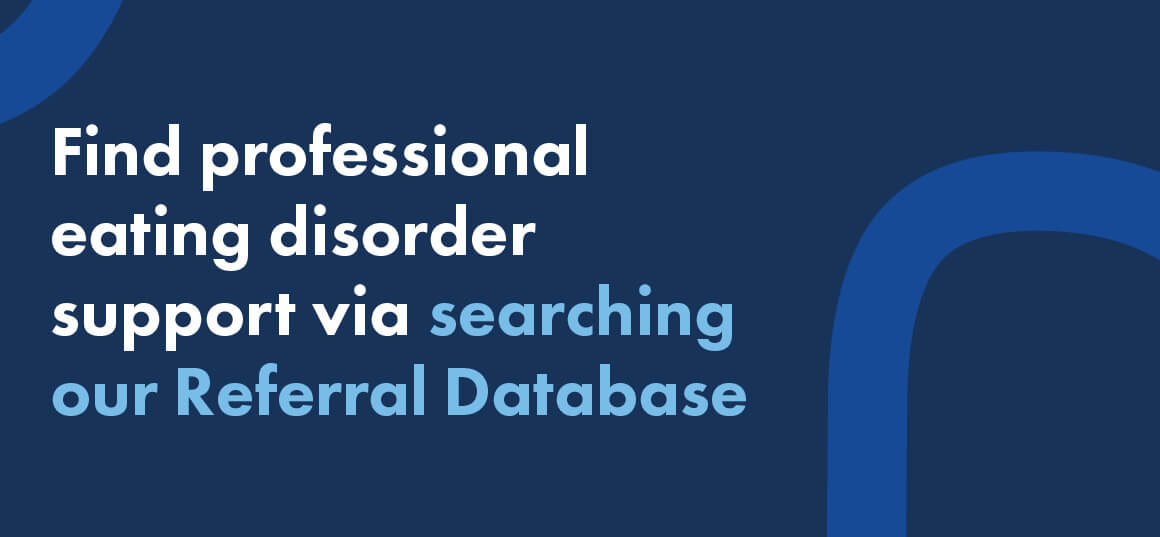Medicare Eating Disorder Plans FAQs
The MBS Item Numbers for Eating Disorders
You can find general information on what the new eating disorder Medicare items are at the following links:
- Medicare
- National Eating Disorder Collaboration (NEDC)
- Australian and New Zealand Academy of Eating Disorders (ANZAED)
- July 1, 2021 changes to MBS Item Numbers (MBS online)
Eating disorder management plan expiry and renewal
For any particular patient, an eating disorder management plan (EDMP) expires 12 months following the start date on the plan. After a plan expires, a patient will require a new EDMP to continue accessing services under the EDMP program. They will then be able to access up to 40 psychological treatment services and 20 dietetic services for 12 months from the start date of this new plan, as long as the threshold of total services allocated has not been exceed within 365 days, including from any other mental health are dietic plans.
Eligibility and Assessment
An individual who has a clinical diagnosis of Anorexia Nervosa OR
An individual has a clinical diagnosis of bulimia nervosa, binge eating disorder or other specified feeding or eating disorder (OSFED) and meets the following eligibility criteria:
- Global EDE-Q score of 3 or higher; and
- the patient’s condition is characterised by rapid weight loss, or frequent binge eating or inappropriate compensatory behaviour as manifested by 3 or more occurrences per week; and
- the patient has at least two of the following indicators:
- Clinically underweight with a body weight less than 85% of expected weight where weight loss is directly attributable to the eating disorder.
- Current or high risk of medical complications due to eating disorder behaviours or symptoms.
- Serious comorbid medical or psychological conditions significantly impacting on medical or psychological health status and function.
- Overnight inpatient admission for an eating disorder in the previous 12 months.
- Inadequate treatment response to evidence-based eating disorder treatment over the past six months despite active and consistent participation.
Eligibility can be assessed by the GP (item 90250-90253) or by a Psychiatrist (item PSY1) or Paediatrician (PAED1). It is their responsibility to either conduct assessments or to review the results of assessments conducted by others. Allied Health professionals may contribute assessment information but are not eligible to make the decision about eligibility. Practitioners should have regard to the relevant diagnostic criteria set out in the Diagnostic and Statistical Manual of the American Psychiatric Association – Fifth Edition (DSM-5)
These are determined by the clinical experience and judgement of the clinician making the assessment or providing recommendations. Clinicians must adequately document and justify their clinical judgments as per usual practice.
Overall assessment and eligibility is determined by a GP, a Psychiatrist, or a Paediatrician. However, GP’s may refer to MHP to conduct assessments, such as the EDE-Q and these can be considered when assessing eligibility.
The EDE-Q is available for clinicians to download online for non-commercial purposes, including on the NEDC and ANZAED websites
Interpretation of eligibility is a matter of clinical judgement. The GP, psychiatrist or paediatrician will review the patient’s progress against the EDP and assessment for ongoing use of the EDP will be based on factors including; client progress, client engagement, treatment effectiveness and overall suitability.
MHPs are expected to provide a written progress report to the GP or Psychiatrist at or before the end of each course of 10 sessions of treatment. This may include recommendations for the next course of treatment.
Yes, if their EDE-Q score is 3 or higher and they meet 2 of the 5 specified indicators.
No.
It can be understandably challenging for individuals to share their experiences of an eating disorder with others, however they are encouraged to reflect on how the eating disorder is impacting their day-to-day life and openly share these experiences with their GP and MHP (who will advise the GP) so that they can make an accurate assessment of their eligibility.
If an individual does not think that the assessment of their eating disorder is correct, they are entitled to seek another opinion.
They are entitled to be assessed by their GP for a Better Access to Health Mental Health Care Plan, where they can receive up to 10 sessions per calendar year.
Who can provide which treatments?
Mental Health Professionals who are currently eligible to provide focused psychological services under the Better Access program. This includes psychiatrists, GPs, clinical psychologists, psychologists, mental health social workers and mental health occupational therapists.
The new items are specifically for evidence based eating disorders treatment:
- Family Based Treatment for Eating Disorders (EDs) (including whole family, Parent Based Therapy, parent only or separated therapy)
- Adolescent Focused Therapy for EDs
- Cognitive Behavioural Therapy (CBT) for EDs (CBT-ED)
- CBT-Anorexia Nervosa (AN) (CBT-AN)
- CBT for Bulimia Nervosa (BN) and Binge-eating Disorder (BED) (CBT-BN and CBT-BED)
- Specialist Supportive Clinical Management (SSCM) for EDs
- Maudsley Model of Anorexia Treatment in Adults (MANTRA)
- viii.Interpersonal Therapy (IPT) for BN, BED
- Dialectical Behavioural Therapy (DBT) for BN, BED
- Focal psychodynamic therapy for EDs
No. However all clinicians treating eating disorders are expected to be knowledgeable and experienced in assessment and management of eating disorders. View the NEDC clinician core competencies
Yes. Dietitians are eligible to provide up to 20 sessions of at least 20 minutes if the GP has provided a referral.
Dietitians can provide sessions for as long as they deem necessary. Individuals may need to pay out of pocket expenses regardless of the session length, as Medicare only reimburses dietetic sessions at one fixed amount.
- MBS services should be provided by qualified and eligible practitioners with the knowledge, skills and experience in providing treatment to patients with eating disorders and meet the NEDC workforce competency standards for the treatment and management of eating disorders. While there are currently no mandated competency requirements for clinicians providing eating disorder treatment, individuals and referring clinicians can ask for a clinician to detail their experience working in the area before referring or working with them (see q.13).
- Butterfly Foundation has Australia’s only national eating disorder practitioner and service referral database that screens professionals for an understanding of eating disorders. You can contact them on 1800 33 46 73 or support@butterfly.org.au
- Alternatively, ANZAED and Inside Out also have online databases of professionals who have indicated an interest in working in the area.
Practitioners should contact their professional organisation to identify education and training. In addition, there is general information available at:
And at State-based eating disorder organisations:
- The Victorian Centre of Excellence in Eating Disorders (CEED) – VIC
- Queensland Eating Disorder Service (QuEDS) – QLD
- Statewide Eating Disorder Service (SEDS) – SA
- WA Eating Disorders Outreach & Consultation Service (WAEDOCS) – WA
Course of Treatment and Maximum Number of Sessions
No. The EDP start and finish date is calculated on a rolling year. E.g. if an EDP is commenced on the 3rd March 2020, it will be valid until 2nd of March 2021. Therefore, a person can use up to 40 sessions (upon completion of reviews) from the start date until the end of 12 months.
There is a maximum of 40 eating disorder psychological treatment sessions allowed in the 12 months following the start date of an EDMP. Any MHCP sessions prior to the EDMP start date do not count towards the 40 sessions allowed in the 12 months after the EDMP start date.
To check how many sessions you or your client is eligible for, you can contact Medicare on;
- Consumers: 132 011; www.mbsonline.gov.au; OR access your My Health Record or Medicare online account.
- Clinicians: 132 150; www.mbsonline.gov.au; OR use the Health Professionals Online System (HPOS) to check if a service is payable or not on a particular service date.
There are ongoing reviews required by the doctor (ie. GP, psychiatrist or paediatrician) who made the initial EDMP referral after every 10 sessions, and that at or before 20 sessions, a review is needed by both the GP and either a psychiatrist or paediatrician to activate access to more than 20 sessions.
Relationship between Eating Disorder Plan (EDP) and other Medicare plans
MHCP sessions amounts will be deducted from the total of 40. Providers are discouraged from using a MHCP and EDMP simultaneously. It is possible for a person to use a MHCP before the EDMP is initiated, however, after the EDMP start date, a maximum of 40 psychological treatment sessions can be claimed in the following 12-month period.
- For example, Shani receives 5 MHCP sessions with her psychologist in February 2020. She starts an EDTP in March 2020. Shani can then access 40 EDTP sessions for the 12-month period from March 2020 until March 2021.
- Another example: Derrick asks his GP to be assessed for an EDMP. The GP refers Derrick for an assessment with a psychologist. The psychologist spends 2 sessions assessing Derrick and then recommends an EDMP. These two original psychology sessions were billed under a MHCP, so Derrick is now entitled to up to 40 EDTP sessions (providing all GP/Psychiatrists approvals happen along the way) in the 12-month period start date from the start date from the EDMP.
Yes, individuals can access reimbursements for issues other than eating disorders under the CDMP however no one can receive rebates for more than 40 psychological treatment sessions in a year. If the person is receiving treatment for a comorbid psychiatric condition then that treatment must be included in the ED plan. A CDMP may be helpful for someone with a physical condition such as diabetes or heart disease. Providers are encouraged to make it very clear in records that the use of the CDMP is very separate to the eating disorder.
Yes however, they will be deducted from the 20 EDP sessions even though they are for a separate presenting issue.
If a person requires simultaneous treatment for another condition other than the eating disorder, this can be included in the EDP. An individual will not be entitled to additional Medicare sessions above 40. If an EDP is not suitable then they can transitioned to the Better Access Medicare scheme for the treatment of their co-morbid conditions. Treatments provided by a psychiatrist are not affected by this restriction.
Reviews & Referrals
A review by a GP is required after sessions 10, 20 and 30 of the EDP and a review by a psychiatrist or paediatrician is required by session 20 of the EDP. Reviews can be completed any time prior to the cut off session. For instance, the psychiatrist or paediatrician review can be completed any time up until or after session 20. However, an individual cannot access more than 20 sessions if they have not completed a psychiatrist or paediatrician review.
No, a person can receive the 20 dietetic sessions at any time during the EDP and reporting is required after the 1st and 20th session and as clinically required.
Individuals are encouraged to obtain a psychiatrist or paediatrician referral early in their EDP and book an appointment as soon as possible. Individuals may feel uncertain about booking this in advance given they may be unsure if they will need it, but it can always be cancelled if no longer required at a later stage.
The new EDP items can be accessed over telehealth, so for some individuals who do not have easy access to a psychiatrist or paediatrician, booking a telehealth appointment can be useful.
Psychiatrists and paediatricians in the Public Health system can provide the 20-session review providing they are registered with Medicare to provide Medicare services. Individuals are encouraged to check that public health clinicians are registered and therefore eligible to provide the review. The reviewing psychiatrist or paediatrician will need to have claimed a specific new MBS item number for the review to activate access to more than 20 psychological sessions under the EDP.
Telehealth and Specific MBS Item Information
Yes, all providers of an EDP can provide Telehealth Services (items 90264 and 90265) via video (not telephone or email). Telehealth may be used if the clinician is satisfied that it is clinically appropriate. Patient and clinician must be located a minimum of 15 kilometres apart at the time of the video consultation. Geographic eligibility standards for telehealth services apply. Eligible areas are those within MMM classifications 4 to 7.
Check eligibility using the locator on the Department of Health’s website. There is no restriction on the number of services that can be provided via telehealth arrangements.
Telehealth Patient-end Support Services may be provided by GP for video consultation with psychiatrist (items 2100, 2122, 2125, 2126, 2137, 2138, 2143, 2147, 2179, 2195, 2199 and 2220 in Group A30).
The MBS website has more information about GP Medicare item numbers.
NEDC has also developed a fact sheet specifically for GP’s.
From 1 July 2021, certain GP and OMP telephone MBS item numbers will no longer be available to access under Eating Disorder Management Plans. Patients will only be able to access certain item numbers with a GP or OMP via video conference or in person.
A range of temporary telephone services has been replaced with a smaller number of MBS items as follows:
- A short consultation item (less than six minutes) for straightforward care, such as repeat prescriptions and diagnostic referrals; and
- A longer telephone consultation item (six minutes and over) for more complex attendances.
Longer telephone items for mental health treatment will continue to be available until 31 December 2021.
Patients will still be able to access MBS Item Numbers for Eating Disorders via video conferencing and in person. For more information see the MBS changes factsheet.
What does this mean for providers?
The temporary MBS telehealth items allow providers to deliver essential health care services to their patients while ensuring continued quality is provided by a medical practitioner who knows the patient’s medical history.
Providers do not need to be in their regular practice to provide telehealth services, but they must ensure that the established clinical relationship, as defined in the MBS, exists before providing telehealth services to their patient. Only a face-to-face attendance with the patient in the 12 months prior to the date of service of the proposed telehealth consultation satisfies this requirement, with limited exemptions. Attendance via telehealth (video or telephone) does not satisfy the requirement of established clinical relationship.
Providers should use their provider number for their primary location, and must provide safe services in accordance with normal professional standards.
Temporary COVID-19 telehealth MBS services can substitute for current face-to-face consultations that are available under the MBS when the service/s cannot be provided due to COVID-19 considerations. The MBS telehealth items have the same clinical requirements as the corresponding face-to-face consultation items.
Rebates for services provided by GPs and OMPs are paid at 85% of the telehealth item fees – these fee amounts have been increased so that the Medicare rebates paid for the new GP and OMP telehealth services are at the same level as the rebates paid for the equivalent face-to-face services. (Due to the urgency of the new telehealth arrangements, the Department of Health has not been able to amend the legislation that establishes 100% rebates for GP/OMP services.)
For additional information on the use of telehealth items, please refer to the Provider Frequently Asked Questions document available on MBSOnline.
Getting Help and Giving Feedback
You can contact several organisations for guidance and support, including;
- Medicare
- Consumers: 132 011. OR access your My Health Record or Medicare online account.
- Clinicians: www.mbsonline.gov.au; MBS item interpretation on 132 150 OR use the Health Professionals Online System (HPOS) to check if service is payable or not on a particular service date.
- Butterfly Foundation on 1800 33 4673 or support@butterfly.org.au
Yes, a review of the Medicare eating disorder items will be reviewed after 12 months.
It is important that you provide your feedback about the challenges and success of these items to inform this review. You can provide this feedback to;
- The Butterfly Foundation on 1800 33 46 73 or support@butterfly.org.au
- ANZAED



















